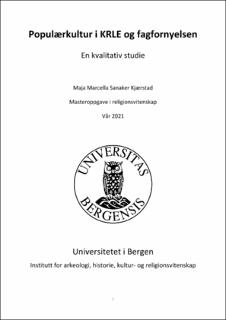Populærkultur i KRLE og fagfornyelsen: En kvalitativ studie
Master thesis
Permanent lenke
https://hdl.handle.net/11250/2760730Utgivelsesdato
2021-06-02Metadata
Vis full innførselSamlinger
- Master theses [240]
Sammendrag
In August 2020 Norwegian schools started to use the new curriculums which have been developed through the renewal of the curriculum called fagfornyelsen. In the religious education subject of lower secondary school, KRLE, one of the changes caused by the renewal is the introduction of a competence goal about religion and popular culture in the curriculum. This addition to the curriculum of KRLE is influenced by developments in religious studies research that explores the relationship between religion and popular culture in different ways. This master thesis aims to explore and analyse how the Norwegian public have responded to the competence goal about religion and popular culture, and how teachers respond to it and use it when they teach the subject. This also relates to how KRLE teachers understand and use popular culture in their teaching in general. The data material for the analysis of the thesis is collected through qualitative interviews with religious education teachers, and written responses to the curriculum draft where popular culture first was mentioned. The thesis shows how the introduction of popular culture to the curriculum has gotten both positive and negative remarks. While some see popular culture as useful to learn youths about religion, others criticise the competence goal in the curriculum. Most of the teachers that were interviewed had used popular culture for different purposes before it was introduced to the curriculum, and most of them are also grateful that this has been added to it. The thesis shows that teachers have different understandings of what popular culture is, and different experiences with the use of popular culture in their teaching. This seems to influence the way they understand and use the competence goal in their teaching.
